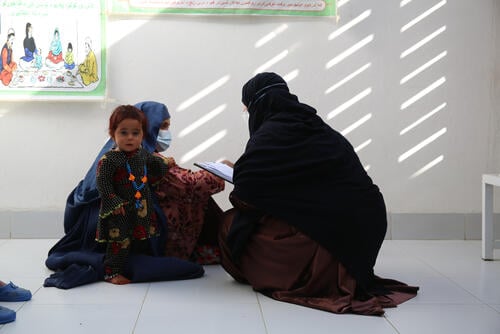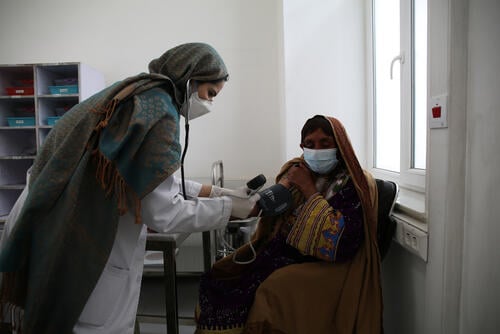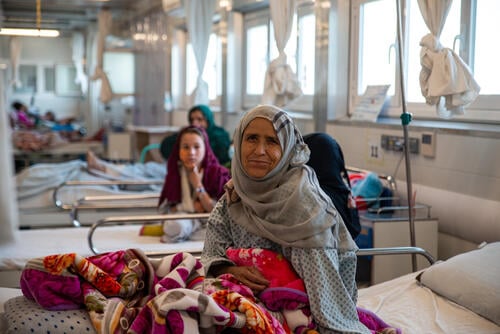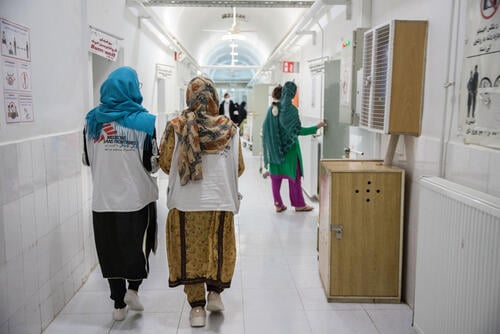Jawahira struggled to find proper medical care after she was infected with tuberculosis (TB).
“I used to visit private clinics, but instead of giving me TB medication, they usually just prescribed me painkillers,” she says.
She was eventually referred to the Médecins Sans Frontières’ (MSF) tuberculosis hospital in Kandahar earlier this year from a clinic in Daikundi, central Afghanistan.
The cost of seeking out treatment also took its toll. “My home is far away in Uruzgan, so when we went to see a doctor, I had to spend 6,000 Afghani (US$67) for the car fare and then 13,000 (US$146) for the drugs they gave me.”
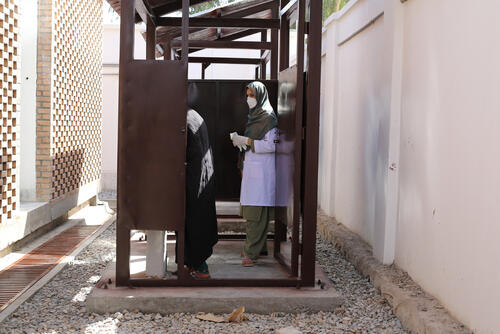
The sum spent by Jawahira on each visit to the doctor is about one-third of the average monthly income in Afghanistan. According to the World Bank, an estimated 60 per cent of people in the country are out of work and receive no income at all.
At the same time, the effects of sanctions, combined with additional financial measures against the government of the Islamic Emirate of Afghanistan (IEA), are being felt nationwide.
People often struggle to afford even basic food items, let alone travel expenses and medical fees for hospital visits. Meanwhile, the public healthcare system is under-resourced, under-staffed and under-funded.
MSF’s 24-bed TB hospital in Kandahar is the only medical facility providing advanced TB care in southern Afghanistan. Many of our patients come from the nearby provinces of Helmand, Uruzgan, Nimroz and Zabul, but others travel from up to 350 kilometres away, from Farah, Dikondi, Badghis, Ghazni and Paktika provinces.
“Many travel from afar, and we support them by paying for transport costs, housing expenses and food to alleviate some of the economic burden,” says MSF medical advisor Allieu Tommy. Without such incentives, most patients could not afford to come for treatment.
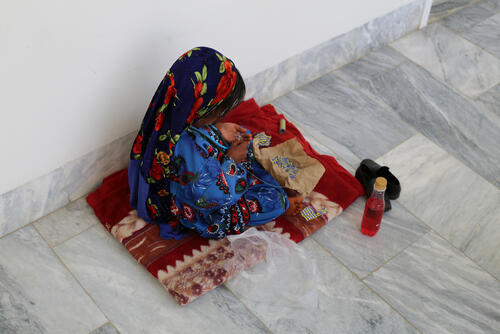
Lack of awareness about TB
Difficulties reaching and affording medical care are not the only barriers to TB treatment faced by people in Afghanistan. Another is the widespread lack of knowledge about the disease.
MSF teams carry out regular health promotion activities in local communities in Kandahar to improve people’s understanding of TB. We also provide information about TB to patients and caretakers at the hospital in Kandahar.
“When a person arrives for the first time and learns that they have TB, we talk to them about what TB is, how it’s transmitted, how to be careful around their family members, and how long the treatment will take,” says MSF nurse Taiba Azizi.
MSF also tests patients’ family members for TB, as the disease is highly transmissible, particularly when people live close together.
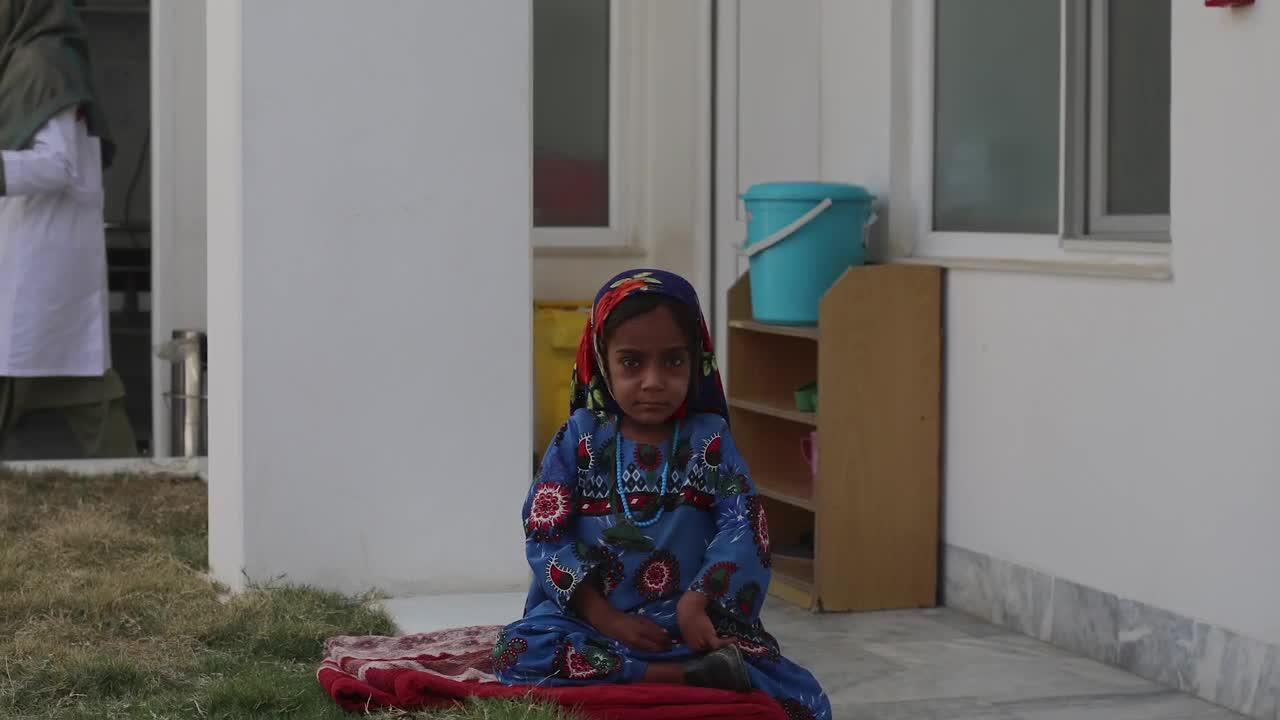
Bibi's story
Home treatment
Some patients have a form of the disease that is resistant to conventional TB drugs and require treatment that lasts from nine to 12 months. This can be especially difficult to cope with whilst in a hospital and far from friends and relatives.
As a result, many patients fail to see their treatment through to the end. But in 2023, following research results, a six-month short course regimen will be introduced that should make it easier for people to finish their treatment.
MSF has already set up a DR-TB programme that combines specialist inpatient care with supervised home-based treatment to help patients better cope with the regimens.
“What we offer is a system whereby a person spends the first 30 days in our facility under careful observation and, if they do not experience major adverse side effects from the drugs taken, they are discharged for home care,” says Azizi.
“Our staff then do weekly follow-ups with them over the phone, meaning that patients only need to come back to the hospital once a month to renew their medications and have an in-person consultation.”
Women and children are most vulnerable to TB
Over 70 per cent of patients in MSF’s Kandahar TB hospital are women and children. “Women and children stay at home in dusty, poorly ventilated rooms for longer periods of time than men,” says Tommy. “If a woman gets infected, the children are likely to catch the disease as well,” he says.
An additional challenge for female patients is that they are generally required to be accompanied by a male family member to the hospital, and this coupled with the economic barriers can significantly reduce their access to healthcare.
It is estimated that tuberculosis and its resistant forms kill more than 13,000 people in Afghanistan every year. Access to proper care remains a major challenge for patients in the southern part of the country, mainly due to insufficient medical infrastructure, length of treatment and financial obstacles.
While MSF’s TB hospital in Kandahar provides quality and free treatment for many, it cannot be seen as a long-term solution. The people of Afghanistan need a health system that meets their needs.
MSF’s Kandahar TB hospital aims to provide patients with quality, free and effective treatment. Our teams have provided more than 13,000 consultations for patients with drug-sensitive and drug-resistant TB so far this year and admitted more than 70 patients for inpatient treatment. We also provide patients with mental health support, carry out health promotion activities within the hospital and in the surrounding area, and deliver technical and financial support to provincial laboratories who offer TB testing.



